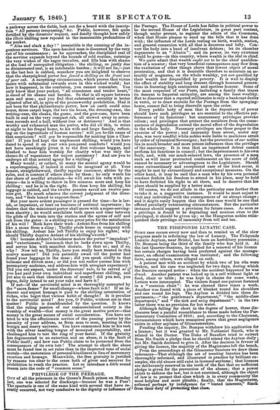PRIVILEGE OF THE PEERAGE.
OuT of all the prisoners in the Queen's Bench prison on Monday last, one was selected for discharge—because he was a Peer ! The spectacle is one of the same kind with several that have re- cently occurred, not very conducive to the dignity or influence of
the Peerage. The House of Lords has fallen in political power to be the second House of the Legislature, in great part content, though under protest, to register the edicts of the Commons, when that House pleases to send up the bills that it has done with ; the influence of the Lords resting on birth, wealth, station, and general connexion with all that is decorous and lofty. Con- vert the body into a band of insolvent debtors; let its chamber degenerate to an " Alsatia" ; and its power, its very existence would be gone—in this country, where wealth is the idol in chief. We quite admit that wealth ought not to be the chief qualifica- tion of a senator; that very beneficial consequences may flow from the exaltation of other things above that lowest object of moral prostration, and that it is desirable therefore to maintain an as- sembly of magnates, on the whole wealthy, yet not qualified by their wealth nor disqualified by poverty. It is well to display the effect of stability and long descent through honoured genera- tions in fostering high sentiments and spotless honour. Some of the most respected of our Peers, including a family that traces its descent to Imperial antiquity, are among the least wealthy. But to discover that a reputed millionaire is only a bankrupt dealer in vertii, or to draw recruits for the Peerage from the sponging- house, cannot fail to bring discredit upon the order.
Every public body of men that is the depository of power should have such privileges as are essential to the effective per- formance of its functions : but unnecessary privileges provoke odium ; and privileges that protect the members from the conse- quences of degradation extend the moral effect of the degradation to the whole body. Necessary privileges are those proper to the exercise of the power ; and immunity from arrest, under any plea, was very needful while nobles were liable to malicious arrest by order of tyrannical Sovereigns ; but the protection of our nobles lies in much broader and more potent influences than the privilege of the sanctuary. It is true that an imprisoned debtor cannot perform his functions in council ; but the imprisonment is his own fault, and, with our much-relaxed laws, the presence of a man such as will incur protracted confinement on the score of debt", cannot be necessary or advantageous to the Legislature. Should some extraordinary and exceptional case of the kind occur, it might be met by extraordinary and exceptional measures. On the other hand, it may be said that a man who by his own personal conduct forfeits his freedom to attend in his place, may be held to have forfeited his right to sit there, and to deserve that his place should be supplied by a better man. Of course, we do not allude to the particular case further than to take it as a suggestive instance. It would be most unjust to visit any individual with the consequences of an abrupt change ; and it might easily happen that the first case would be one that offered peculiarly extenuating circumstances. But the particular instance should suggest a provision for future cases. As soon as a privilege is found to be degrading and noxious even to the privileged, it should be given up ; as the Hungarian nobles relin- quished their privilege of immunity from toll and tax.






























 Previous page
Previous page